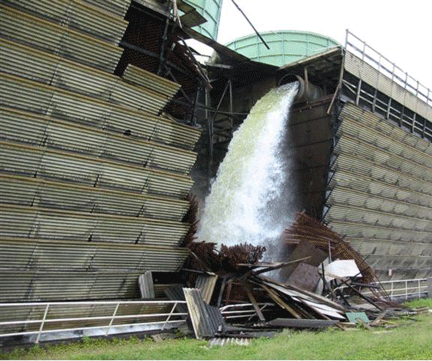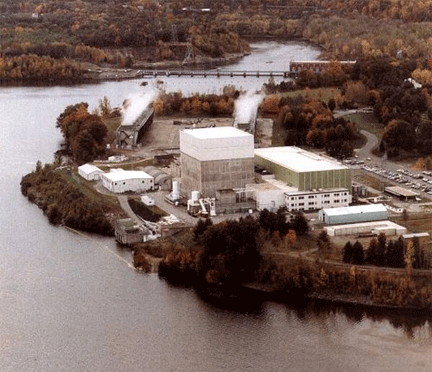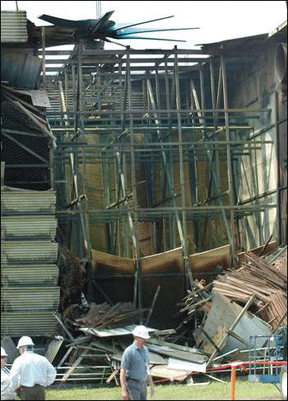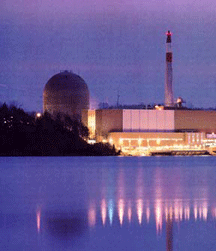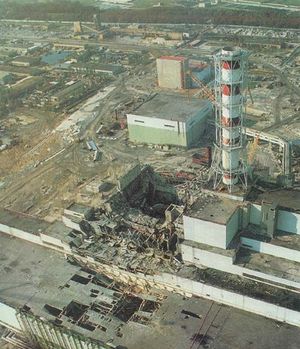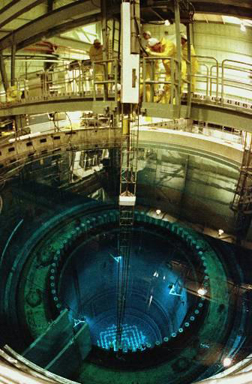albanyweblog.com
Updated
September 2, 2007
A weblog about the politics and affairs of the old and glorious City of Albany, New York, USA. Articles written and disseminated from Albany's beautiful and historic South End by Daniel Van Riper. If you wish to make a response, have anything to add or would like to make an empty threat, please contact me.
NEW! Albanyweblog now has RSS!
Click on this link to add this site to your RSS feed.September 2 , 2007
Vermont Nuke Plant Collapse
The corporate media suppresses a story
vital to our health and well being
Last Friday, August 24, a cooling tower collapsed spectacularly at the Vermont Yankee Nuclear power plant outside Brattleboro, Vermont. Some 360,000 gallons of heated and possibly slightly radioactive water spilled out and into the Connecticut River.
Is this important to us here in Albany? Well, for starters, Yankee Nuke is a lot closer to us than the more familiar Indian Point Nuclear power plant in Buchanan south of Peekskill, on the Hudson. Indian Point is 111 miles away from us, while Yankee is about 77 miles away.
The closer the plant, the more likely it can kill us. All of us. Call me a wild eyed radical if you will, but if parts of the Vermont nuclear device are collapsing “unexpectedly” then those of us who live well inside a hundred miles of this thing ought to be informed about this disaster. Indeed, the whole world should hear about it.
That’s why I’m posting this article. You probably didn’t hear about it. As far as I know, local corporate media coverage of the collapse has been slim to nonexistent. I don’t believe there has even been a passing mention in the Hearst Times Union. Forget about the TV. The characteristically lame article presented by the Associated Press news monopoly does not seem to have landed in any non-internet media outside of Vermont.
The persons who own and operate Yankee Nuke put on a show of expressing surprise at the “sudden” collapse of the cooling tower. But the folks who work inside the plant were not surprised, nor were the local environmental groups. They’ve been warning the world that the plant has been falling apart for the last two years.
Yankee is owned and operated by the notorious predatory international corporation Entergy. This outfit is a holding company that scoops up power plants around the world and squeezes every last bit of profit from them by any means available.
Think of Entergy as another Enron, but more under the radar with their corruption. Entergy was originally spawned in Texas, a place where evil people and organizations are generated with fecundity. Like Enron, they have close ties to the filthy Bush family, enjoying the benefits of legal protection by the royals.
Entergy snapped up Yankee Nuke in 2002 for $180 million from the Vermont Nuclear Power Corporation, a heavily regulated local entity. Like most privatization schemes, the sale was a sweet deal for the corporate predator. For that price, Entergy got everything, the plant, fuel rods, real estate.
They also got a $310 million trust fund which is supposed to be used to decommission the plant when it’s finally worn out by exploitation. Nice, eh? I’d like to get a $100 trust fund everytime I spend fifty bucks on groceries.
And best of all, Entergy received, as part of the deal, a ten year power purchase agreement (PPA.) No matter what happens, Entergy can sell their electrons to the grid, guaranteed.
But there’s always a catch to these fairy tale success stories. Yankee Nuke is only licensed to operate until 2012, after which the plant comes up for review. Considering the age of the nuke plant (opened in 1972) and its lousy current condition, and the steady outraged public opposition to the very existence of this bomb, renewal of the license in 2012 is a long shot at best.
So that means Entergy now has less than five years to squeeze as much profit out of this cash cow before it finally dies and has to be disposed of. This means that Entergy, which like all corporations serves nothing except “the bottom line,” has no time for frivolities such as maintenance and safety. No time, for instance, to fix the cracks that are showing up all over the complex.
And they’ve needed to ramp up production to meet their financial projections and executive bonuses. Thus the federal Nuclear Regulatory Commission (NRC) gave Entergy permission to increase the output of Yankee Nuke by some twenty percent.
Are you ready for this little detail? For the past eighteen months, Yankee Nuke has been operating at 120 percent of its designed capacity. This old nuclear engine has been running hard. Everything, and I mean everything, is subordinate to the corporate bottom line. According to the Brattleboro Reformer:
Entergy and the Department of Public Service certainly look foolish right now, and their claims that all is well at Vermont Yankee ring more hollow with every new mishap at the plant. The list of mishaps -- lost fuel rods, transformer fires, blown pump seals, electrical problems -- is long. And, they seem to be coming more frequently since Entergy got approval to increase Vermont Yankee's power output by 20 percent.
There’s no official story yet, but thanks to local reporting in Vermont, we can piece together what happened. And why. You see, all nuke plants generate waste heat and have to be cooled with water. The harder they run, the more water they need, and the hotter the water gets.
David Lochbaum, nuclear safety engineer with the Union of Concerned Scientists, explained that nuke plants are 33 percent efficient:
"While the reactor core may produce three units of energy, only one unit of electricity is generated," [Lochbaum] wrote. "The remaining two units of energy must be discharged to the environment as waste heat. Nuclear plants rely on large amounts of water to carry away this waste heat."
Nuke plants are usually planted next to major rivers so they can cool off with river water. But thanks to strong and united local public action, Yankee Nuke is only allowed to raise the temperature of the Connecticut River by one degree. Thus they can’t dump their 100 degree plus water straight into the river.
Indian Point doesn’t have this problem. A hot plume boils out of Indian Point, raising the overall temperature of the Hudson south of Peekskill. This has wreaked havoc with the Hudson’s ecosystem, contributing to the disappearance of plankton in the river, for starters.
The folks around Brattleboro are quite a bit tougher than we are here on the banks of the Hudson. They would not allow their river to be burned to death by a nuke, like we have.
So here was Yankee Nuke running day and night at over capacity, generating more and hotter water than ever before. They couldn’t dump it into the river (except now and then when nobody was looking.) So they needed to cool their water in the cooling towers before dumping it.
Unfortunately, the existing cooling towers were not up to the task of overproduction. And, it should go without saying, Entergy was not going to build towers that could handle the load of hot water. That would cut too deeply into profits and waste precious time between now and 2012.
So Entergy had their workers haul two big-ass gigantic fans to the top of the eleven towers. It seems that these fans had been making funny noises just before the collapse. I think we can safely assume that these fans were working very, very hard. We can also assume that the law of gravity is still strictly enforced in Vermont.
Mr. Lochman is reluctant to draw conclusions yet, but he points out that there are plenty of reasons for the tower to collapse:
"Did increased water flow rate through the cooling towers, or higher cooling tower fan turning rates, cause the collapse?" asked David Lochbaum . . . "If so, why didn't the company's and the NRC's pre-uprate reviews identify this threat and prevent it from happening?" If they did miss the problem, he wrote, "what other misses have not yet revealed themselves?"
There’s the big question. This big pile of radioactive crap along the Connecticut River could really do a number on the surrounding countryside if it suddenly fell apart “without warning.” We live 77 miles away. We’re very much part of the surrounding countryside of Yankee Nuke.
The “Dead Zone” around Chernobyl in Ukraine, the site of the biggest nuclear disaster so far, begins at around 86 kilometers, or 53 miles. This is the area around the infamous Soviet nuke plant that is completely abandoned by all human life, and will remain abandoned for at least the next 900 years. No one dares visit the area except for brief visits, and you have to be crazy to do even that.
The town of 10,800 people is empty, people’s possessions sitting untouched and irretrievable because of contamination. Outside the dead zone, quite a distance away, radiation levels are consistently higher than they should be. And of course, official estimates of ongoing death and injury caused by persistent radiation in the soil and water are much lower than shown by independent studies.
If Yankee Nuke were to meltdown like Chernobyl did, the equivalent surrounding dead zone would reach into Renssalear County as far as Grafton Lakes State Park.
Okay, accounts of the events inside the Chernobyl nuke plant read like an episode of The Simpsons. “Human Error” is an awfully polite description of the bumbling that caused the disaster. It would be funny like a TV cartoon except that this is real life.
The workers at Yankee Nuke are responsible union members, the core of whom predate the corporate acquisition of the plant. When the cooling tower collapsed “unexpectedly,” they swung into action and contained the mess, shutting down the plant efficiently and without incident. Entergy managers should count themselves lucky that they have not yet been able to sovietize the Yankee Nuke work force.
But stories are circulating that Yankee Nuke is falling apart. Most of these stories begin with the workers, stories which are alluded to in a recent press release by the Utility Workers Union of America (UWUA.) As James Moore of Vermont Public Interest Research Group put it:
What is very clear from the union's press release is that there are safety concerns at Vermont Yankee that have not made it out to the public. We would hope that the employees have public safety first and foremost in their minds, but we have serious concerns that Entergy Corporation is cutting corners to increase their profits, potentially at the risk of millions of people who live in the area surrounding Vermont Yankee.
The problem is that the workers are afraid to come forward with their tales for fear of reprisal by the corporate owners. Thus, the “official” story is that Yankee Nuke is in great shape. But the federal Nuclear Regulatory commission (NRC) is only going to let the plant run at 50 per cent capacity from now on. Just in case.
Well, that’s kinda reassuring. But such a situation is surely intolerable to Entergy. Time is running out for the profit machine, surely the corporation does not want to run Yankee Nuke at less than half speed.
I think that one of several things will, happen. Entergy will try to find a way to cut costs drastically, probably by disenfranchising the union and by crying piteously for special subsidies and tax breaks. Or, they will try to unload the nuke plant, but who would buy it?
Or maybe they will contact their friends in the White House and quietly get the plant back up to running at 120 percent capacity. That’s a possibility because of the information blackout imposed by the corporate media.
Then again, perhaps Entergy will simply cash in the trust fund and decommission the plant. If they do, you can be sure that they will be bawling like little babies about their unreasonable burden, etc. but at least we would be rid of this ticking time bomb. We can always hope, can’t we?
Well, I wanted all of you to know about this dangerous development and what it means to us. And I wanted all of you to know that the local corporate media has suppressed this story.
And please don’t worry. The people in charge have your best interests in mind. Go about your business as if everything is fine.
Prior Post * * * Next Post
This site maintained by Lynne Jackson of Jackson's Computer Services.

